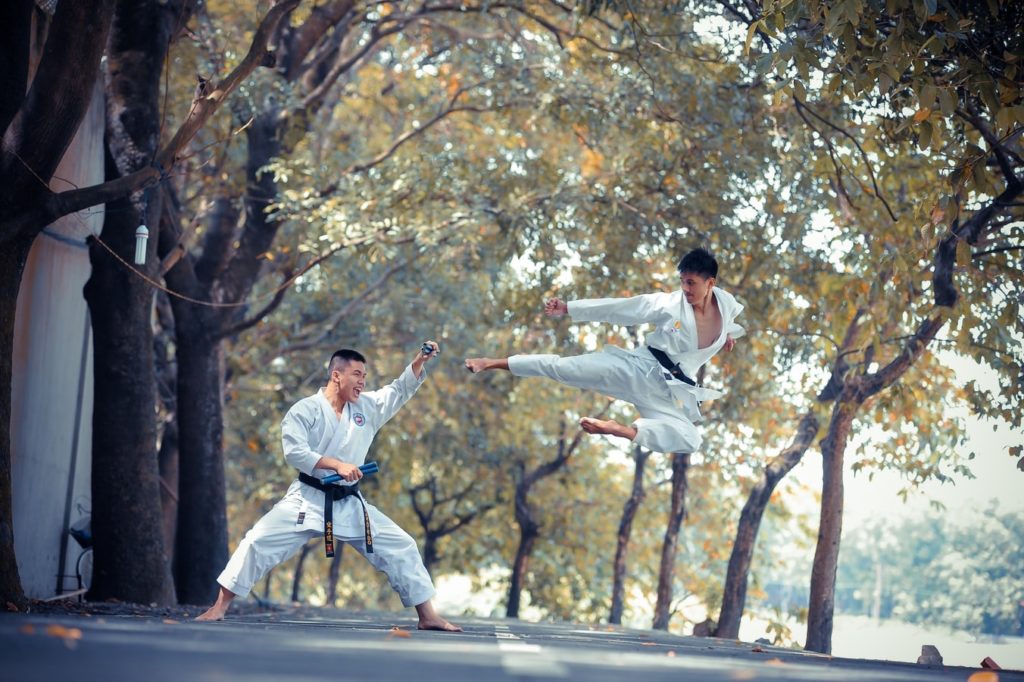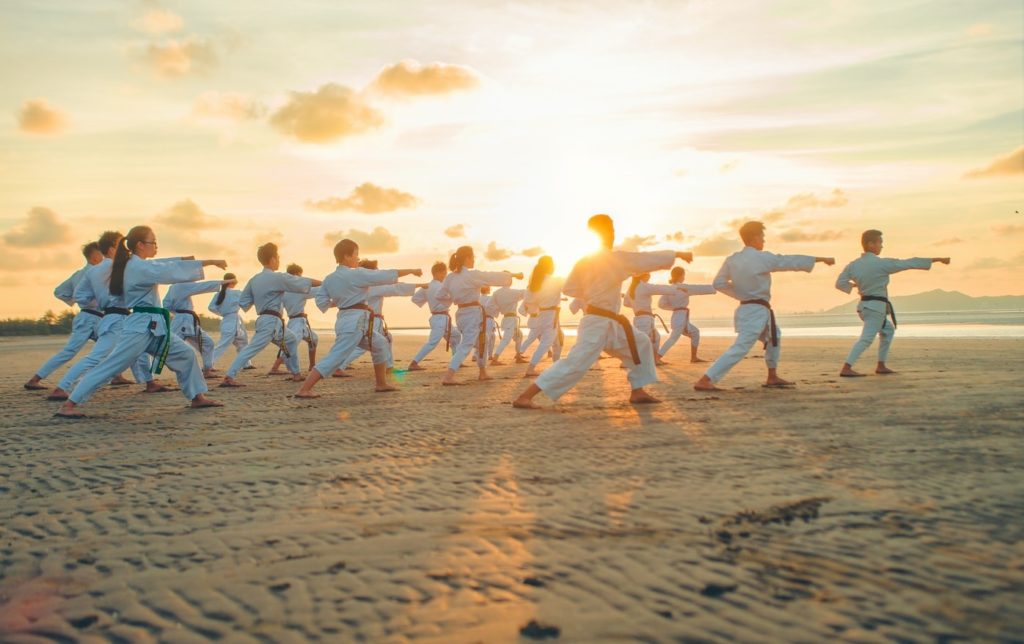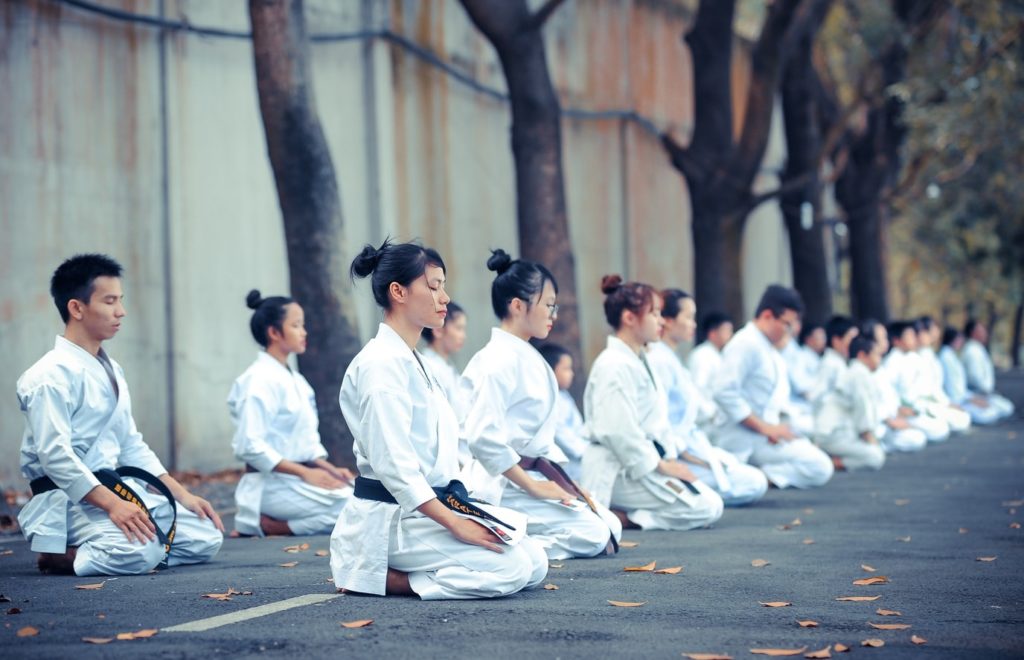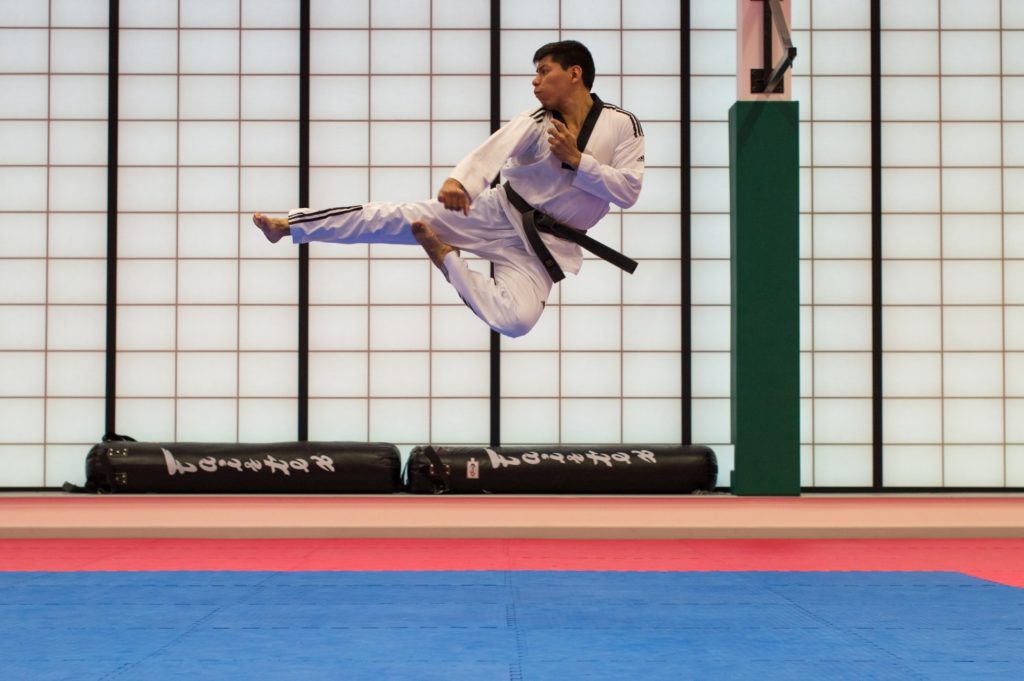Karate instructors teach students the physical skills, techniques and core values at the foundation of this ancient martial art that can be traced to 14th century Japan.
As a karate instructor, your role is to teach this martial art to children and adults, demonstrating the many techniques at the core of karate. This includes punching, kicking, knee strikes, elbow strikes and open-hand techniques such as knife-hands, spear-hands and palm-heel strikes.

Self-defense is a core goal of karate training, but so too is the development of self-confidence and embracing the spiritual side of martial arts.
You’ll help students develop the muscles and reflexes needed to succeed at karate, evaluate them as they advance through belt levels and, always, teach them to embody the ideals of karate.
Most karate instructors have attained the black belt level before opening their own training studio. If you haven’t earned the black belt, this is something to consider as you train to become an instructor. Because so many karate teachers have reached their highest ranking, it will be difficult to compete with them for students until you have also received a black belt.
As an instructor, you can make a good living while enjoying the satisfaction of teaching others how to protect themselves while striving for the spiritual strength that comes with practicing this 700-year-old martial art. Read on to discover what you need to do to prepare yourself as a karate instructor.
In this article you’ll learn:
- How much money you can make as a karate instructor
- The required training and certifications
- Professional groups to join
- Employment opportunities for karate instructors
- Finding clients
- Plus helpful tips
How much money can you make?
The average annual salary for karate instructors is $55,127, according to the US Bureau of Labor Statistics. The bureau estimates that employment for karate instructors is likely to increase by 13% through 2028 as fitness, health and weight loss remain high priorities for Americans.

Training and Certification
There are no licensing requirements for karate instructors and nothing in the way of regulations to prevent you from opening a training studio. You’ll still need to be able to demonstrate expertise in karate and have some skill as an instructor to teach effectively. This is where specialized training comes into play. Attaining black belt status alone may take 3-4 years. While you do not absolutely require a black belt to teach, reaching the highest skill level will give you much more credibility with potential students looking for a karate training program.
Earning a black belt means you’ve proven that you can remember and execute the techniques of your martial arts style — karate. A black belt doesn’t mean that you have been trained in how to teach that style. Teaching is both an art and science that most martial arts instructors are never taught. When you are trained to teach martial arts you can become certified as a karate instructor. Certification is what will set you apart from other instructors. Most importantly, you’ll have the credentials to teach with confidence.

You can choose from online and in-person training programs. Average prices start at about $300.
Some of what you’ll learn in training:
- How to teach the principles of karate in a safe and encouraging manner
- Remaining patient in working with students
- Planning classes and classroom management
- Ways to motivate students toward excellence
- Understanding the theory behind karate technique
- Communication skills to interact effectively with students
- Basic first aid
- Fundamental business skills to prepare you for operating your own studio
Here is a list of Karate Instructor Schools to get you started.

Professional Groups to Join
Joining a professional organization is one way to show your dedication as a karate instructor. You’ll get to meet others who share your passion for martial arts and learn from more experienced instructors. Credentials that come with professional memberships can also be displayed at your studio, as well as on your website and marketing materials.
The World Karate Federation, established in 1990, is the largest international Karate governing body with 191 member countries and is the only Karate federation recognized by the International Olympic Committee. They oversee competitions and hold regular events worldwide.
The American Karate Association is one of the largest martial arts associations in the country — their roots reach back to 1964. Steeped in honor and tradition, the American Karate Association continues to uphold the traditions of the past while nurturing the talent of the future. Joining will connect you with other members where you can share teaching ideas and enjoy talking about karate, while learning insider tips and techniques for classroom success. You’ll also be able to qualify for and participate in team competitions.

The Martial Arts Teachers Association offers training and certification for instructors, plus deep resources for learning how to run a profitable martial arts studio, as well as access to affordable insurance plans. Membership is $37 a month or $199 for a full year paid in advance.
This extensive list of Karate Instructor Networking Groups can help you find informal online gatherings of instructors.
Employment
You’ll find job openings for karate instructors at martial arts studios, public recreation centers, the YMCA, larger gyms with fitness programs and fitness centers focused on children.
You’ll want to prepare copies of your resume, both printed and for online distribution. When sending resumes by email, the best way to attach documents to your email is by creating .pdf files of the documents with Adobe Acrobat. These types of files are considered safe to send and are far less likely to trigger a spam alert in the recipient’s mailbox. Follow this tip and you’ll have a much better chance that your online correspondence lands in front of a real person, not a spam folder.
Also make photocopies of your professional certifications and memberships in karate organizations. These extra materials can pull your application to the top of the pile and set you apart from competitors for the same job.
Finding Clients
Business cards and a basic website should be the core of your marketing toolkit as a karate instructor. The website can be as fancy as you like, so long as it is attractively designed, with photos of your karate studio, students practicing their moves and a few images of you in action, teaching students. Your business location and contact information should be clearly visible at the top of every page on your website. Search engines scan this information to match your website geographically with people searching for a karate instructor.

In addition to your business website, the next thing to do is create an Instagram account to showcase your karate studio. Instagram is the #1 online venue for professionals to present themselves. It’s a free promotional tool that’s always working on your behalf.
Now set up a Facebook page for your karate school. This is a great way to build a following and keep people up-to-date on your offerings.
Be sure to create a Google My Business page, where you can add hours of operation, photos and an interactive map of your location.
All of the above services are free and setting up a page on each site takes less than an hour.
Other strategies for attracting new business:
- Create a referral program with discounts for returning students who bring new people to class.
- Ask students to review your karate training online. According to a recent survey, 90% of people say their buying decisions are influenced by positive online reviews.
Good to know
Insights from karate instructors on what elevates a good martial arts teacher to a great teacher:

Patience
Students will vary in skill level, with some advancing much faster than others. Great instructors teach at a student’s speed without making anyone feel bad.
Practice
Just because you’re now an instructor doesn’t mean your own learning is at an end. You must practice your skills to maintain and hopefully improve them. Instructors who continue to learn and grow are able to share their wisdom with students.
Connect with Students
Get to know everyone in every class. Ask about their interests, their aspirations, what they want to get out of their training sessions. As long as you are sincere, students can see that you care. They will try harder and are more likely to recommend your classes to others.
Plan the class
Be prepared with a solid plan for every session. Students will know if you’re “winging it.” Plus, once you’ve taken the time to get to know each student, you’ll have a better sense of skill levels. This can serve as a guide for preparing each class.
Motivate
Great karate instructors know how to motivate students to be their best. The first step is to demonstrate your own passion for martial arts. Enthusiasm is contagious.
Be Flexible
Not everyone learns at the same pace. There may be occasions when the class vibe is off. Knowing when to switch gears and try something different on the fly can help you regain student interest and excitement.
Be Respectful
To receive respect, the instructor must show respect. You are in charge. How you present yourself sets the tone for the rest of the class.
Teach Skills AND Theory
Karate training involves self-defense, yes, but there are also spiritual and theoretical components. A holistic approach to training will give your students the most value for their time and investment in your classes.
If you enjoyed this article, check out some more great PocketSuite.io content that can help you grow your career as a karate instructor. Here’s a great place to start.
PocketSuite has thousands of business owners who all started where you are right now. Our community is always happy to help you ramp up, grow your client base, and achieve your income goals, both within the PocketSuite app and as part of our exclusive Facebook Community Group. PocketSuite’s vision is for any professional to be able to work for themselves and make a great living. It starts here. It starts with you. It starts today. Let’s get started, download PocketSuite now! Feel free to reach out with any questions (we’d love to hear from you)! Text us @ (415) 841-2300.



